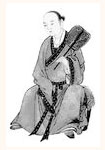《酹江月(武昌怀古)》 葛长庚
楼橹横波征雁远,谁见鱼龙夜舞。
鹦鹉洲云,凤凰池月,付与沙头鹭。
功名何处,年年惟见春絮。
非不豪似周瑜,壮如黄祖,亦随秋风度。
野草闲花无限数,渺在西山南浦。
黄鹤楼人,赤乌年事,江汉亭前路。
浮萍无据,水天几度朝暮。
作者简介(葛长庚)

白玉蟾(公元1194 - ?;现学界对其卒年尚有多种说法;)本姓葛,名长庚。为白氏继子,故又名白玉蟾。字如晦、紫清、白叟,号海琼子、海南翁、武夷散人、神霄散吏。南宋时人,祖籍福建闽清,生于琼州(今海南琼山)人,一说福建闽清人。幼聪慧,谙九经,能诗赋,长于书画,曾举童子科。及长,因“任侠杀人,亡命至武夷”。
《酹江月(武昌怀古)》葛长庚 翻译、赏析和诗意
《酹江月(武昌怀古)》是宋代葛长庚创作的一首诗词。以下是诗词的中文译文、诗意和赏析:
中文译文:
汉江北泻,流经长江和淮河,冲刷着历史的沉积物。
楼船横波,征雁飞过遥远的水面,谁见过鱼龙夜间翩舞。
鹦鹉洲上的云彩,凤凰池中的月光,只能留给沙头上的鹭鸟。
功名荣誉在哪里,每年只看到飞舞的春花。
并非没有豪杰像周瑜一样,英勇如黄祖,也随着秋风消逝。
野草和休闲的花朵无数,遥远在西山和南浦之间。
黄鹤楼的人们,赤乌的岁月,江汉亭前的道路。
浮萍无处栖身,水天几度朝朝暮暮。
诗意:
这首诗词以武昌为背景,通过描绘汉江的流淌、江上的景色和人物,表达了对逝去岁月的思念和对江南地域的感慨。诗中融入了历史典故和自然景观,展现了作者对历史沧桑和人生离别的感叹之情。
赏析:
这首诗词以流水、船只、鸟雁和自然景观为主要描写对象,通过对自然景物的描绘,表达出对时光流转和岁月更迭的感慨。诗中运用了对比和象征的手法,以突出作者对历史和人生的思索。
诗中描述了汉江北泻的景象,流经长江和淮河,洗净了胸中的尘埃,流淌着古今的历史。楼船横波、征雁飞过远处的水面,描绘了江上的景色和远方的美景。诗中的鹦鹉洲上的云彩和凤凰池中的月光,代表着美丽的景色,但只能留给默默守望的沙头鹭鸟,暗示了作者对美好事物的向往和无法拥有的遗憾。
诗中提到功名荣誉的消逝,年年只看到飞舞的春花,表达了对名利和荣誉的淡漠态度。诗人将自己与历史上的英雄人物周瑜、黄祖相比,表达了对英雄气概和豪情壮志的向往。野草和休闲的花朵的描绘,强调了自然景观的美丽和人生的闲适。最后,诗中提到黄鹤楼的人们、赤乌的岁月和江汉亭前的道路,暗示了历史的变迁和人生的起伏,以及浮萍漂泊和水天交替的无常。
整首诗词通过对自然景物和历史人文的描绘,抒发了作者对逝去岁月和江南地域的怀念之情,同时展现了对历史典故和人生意义的思考《酹江月(武昌怀古)》 is a poem written by Ge Changgeng during the Song Dynasty. Here is the Chinese translation, poetic meaning, and an analysis of the poem:
Chinese Translation:
汉江北泻,流经长江和淮河,冲刷着历史的沉积物。
楼船横波,征雁飞过遥远的水面,谁见过鱼龙夜间翩舞。
鹦鹉洲上的云彩,凤凰池中的月光,只能留给沙头上的鹭鸟。
功名荣誉在哪里,每年只看到飞舞的春花。
并非没有豪杰像周瑜一样,英勇如黄祖,也随着秋风消逝。
野草和休闲的花朵无数,遥远在西山和南浦之间。
黄鹤楼的人们,赤乌的岁月,江汉亭前的道路。
浮萍无处栖身,水天几度朝朝暮暮。
Poetic Meaning:
The poem "酹江月(武昌怀古)" is set in Wuchang and expresses the poet's nostalgia for the past and his contemplation of the Jiangnan region. The poem incorporates historical allusions and natural scenery to convey a sense of longing for bygone days and the landscapes of the Jiangnan region. It reflects the poet's sentiment toward the passage of time and the transience of life.
Analysis:
The poem focuses on the flowing river, boats, birds, and natural landscapes to express the poet's reflection on the passage of time and the changes of the seasons. The use of contrasts and symbolism emphasizes the poet's contemplation of history and life.
The poem describes the scene of the Han River flowing northward, passing through the Yangtze River and Huai River, washing away the dust in the poet's heart, and carrying the history of the past and present. The description of boats creating ripples on the water and migrating geese flying over the distant surface depicts the scenery on the river and the beauty of the distance. The clouds above Yingwu Island and the moonlight in the Fenghuang Pool are portrayed as beautiful scenes, but they can only be enjoyed by the herons quietly standing on the sandy shore, indicating the poet's yearning for beauty and the regrets of not being able to possess it.
The poem mentions the fading away of fame and honor, and each year, only the dancing spring flowers are seen, expressing the poet's indifference towards worldly success and glory. The poet compares himself to historical heroes such as Zhou Yu and Huang Zu, expressing his yearning for heroic spirit and aspirations. The depiction of wild grass and leisurely flowers highlights the beauty of natural scenery and the leisure of life. Lastly, the poem mentions the people of Huanghe Tower, the years of the Chiwu, and the road in front of Jianghan Pavilion, implying the changes of history, the ups and downs of life, and the transient nature of floating duckweed and the alternation of water and sky.
The poem expresses the poet's nostalgia for the passing years and the Jiangnan region through descriptions of natural scenery and historical culture. It also reflects the poet's contemplation of historical allusions and the meaning of life.
《酹江月(武昌怀古)》葛长庚 拼音读音参考
lèi jiāng yuè wǔ chāng huái gǔ
酹江月(武昌怀古)
hàn jiāng běi xiè, xià zhǎng huái xǐ jǐn xiōng zhōng jīn gǔ.
汉江北泻,下长淮、洗尽胸中今古。
lóu lǔ héng bō zhēng yàn yuǎn, shuí jiàn yú lóng yè wǔ.
楼橹横波征雁远,谁见鱼龙夜舞。
yīng wǔ zhōu yún, fèng huáng chí yuè, fù yǔ shā tóu lù.
鹦鹉洲云,凤凰池月,付与沙头鹭。
gōng míng hé chǔ, nián nián wéi jiàn chūn xù.
功名何处,年年惟见春絮。
fēi bù háo shì zhōu yú, zhuàng rú huáng zǔ, yì suí qiū fēng dù.
非不豪似周瑜,壮如黄祖,亦随秋风度。
yě cǎo xián huā wú xiàn shù, miǎo zài xī shān nán pǔ.
野草闲花无限数,渺在西山南浦。
huáng hè lóu rén, chì wū nián shì, jiāng hàn tíng qián lù.
黄鹤楼人,赤乌年事,江汉亭前路。
fú píng wú jù, shuǐ tiān jǐ dù zhāo mù.
浮萍无据,水天几度朝暮。